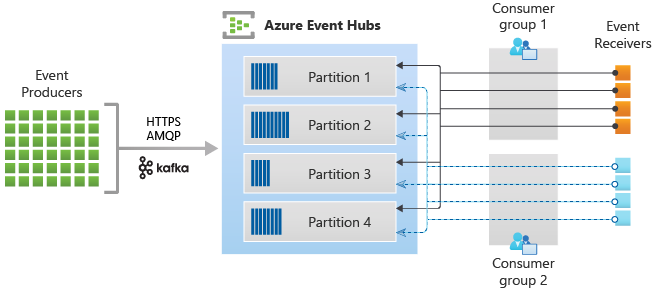- It is a Big Data streaming platform and event ingestion service, capable of receiving and processing millions of events per second.
- It can process and store events, data, or telemetry produced by distributed software and devices.
- Data sent to an event hub can be transformed and stored using any real-time analytics provider or batching/storage adapters.
- Event Hubs represents the "front door" for an event pipeline, often called an event ingestor in solution architectures.
- An event ingestor is a service that sits between event publishers and event consumers to decouple the production of an event stream from the consumption.
Concepts
- Event Producers: Any entity that sends data to an event hub.
- Event publishers can publish events using HTTPS or AMQP 1.0 or Apache Kafka.
- Partitions: Consumers only reads a specific subset (partition) of the message stream.
- Consumer Groups: A view (state, position, or offset) of an entire event hub.
- Consumer groups enable multiple consuming applications to each have a separate view of the event stream, and to read the stream independently.
- Throughput Units: Units of capacity that control the throughput of Event Hubs.
- Event Receivers: Any entity that reads event data from an event hub.
- All Event Hubs consumers connect via the AMQP 1.0 session.
- Events are delivered through the session as they become available.

Common Scenarios
- Anomaly detection (fraud/outliers)
- Application logging
- Analytics pipelines, such as clickstreams
- Live dashboarding
- Archiving data
- Transaction processing
- User telemetry processing
- Device telemetry streaming

